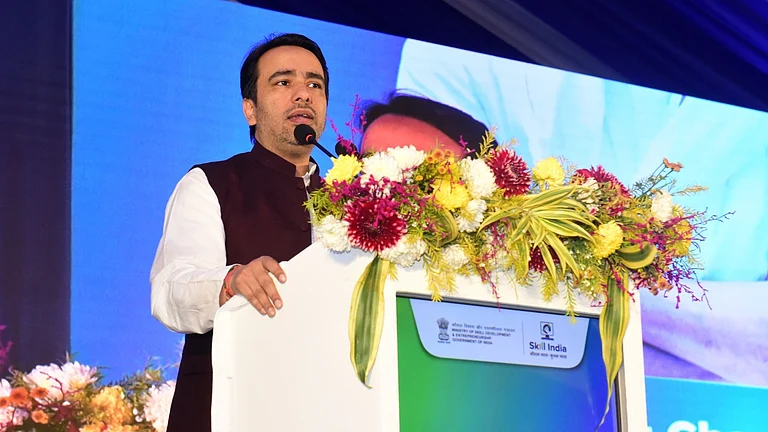Artificial intelligence (AI) is playing a pivotal role in reshaping learning experiences in the rapidly evolving educational landscape, with universities and edtech platforms at the forefront of this transformation.
Industry leaders report a surge in demand for AI skills, with enrolments skyrocketing and a focus on up-skilling individuals across career stages.
Educational institutions are swiftly adapting and offering specialised AI courses to cater to the evolving skill requirements, reflecting a paradigm shift in the educational landscape toward embracing technology.
According to a report by industry body Nasscom, India ranks first in AI skill penetration with a score of 3.09, driven by higher-than-average compensation and growth prospects.
Its another report said that data and AI could add USD 450-500 billion to India's GDP by 2025.
upGrad co-founder and MD Mayank Kumar said GenAI is on track to become an "excel-like phenomenon".
"The market is already showing a high demand for specialised skills, reflected in our enrolment figures. This trend is not limited to mid-career or senior professionals; even freshers are keen on developing basic AI skills, regardless of their industry ecosystem.
"Enrolments in Tech, Data, and GenAI courses on upGrad reached 6,000 per quarter in FY24, with 1.4 lakh learners joining free courses in a year," Kumar said.
Raghav Gupta, MD, APAC and India, Coursera, echoed the sentiment of surging demand for AI skills.
"Roughly, every 3 minutes in 2023, someone in India enrolled for GenAI content on Coursera. In 2024, this demand quadrupled with enrolment every minute," he added.
He further said AI will be both a disruptor and an enabler.
"The rapid advancement of Generative AI is reshaping industries and even putting high-skilled jobs at risk of automation. The soaring demand for GenAI courses on Coursera is indicative of the potential this technology can unlock. It's one of those technologies that has the key to address its disruption, revolutionise education and transform not only 'how' but 'what' we all learn," Gupta said.
Former finance minister Arun Jaitley, in his budget speech for 2018-19, mandated public policy think tank NITI Aayog to establish the National Program on AI to guide research and development in new and emerging technologies.
Under the National Strategy for AI, five key sectors are targeted for AI implementation -- Healthcare, Agriculture, Education, Smart Cities and Infrastructure, and Smart Mobility and Transportation. It also addresses ethical, privacy, and security concerns related to AI integration.
It emphasises the need for the FAT (Fairness, Accountability, and Transparency) framework and data and IP protection to support AI innovation.
Up-skilling and specialisation courses are being introduced for freshers and experienced individuals. This paradigm shift is being swiftly and effectively incorporated by online platforms and universities, with graduate and post-graduate courses offering significant add-ons and specialisations in AI.
Indian Institute of Technology Delhi introduced "An Introduction to Artificial Intelligence" for undergraduate students majoring in computer science. Management institutes and even art colleges are following suit.
Assistant Professor of Digital Media at the Indian Institute of Mass Communication Vinit Utpal said the penetration of AI is not limited to tech-driven industries but goes beyond administrative and other sectors as well.
Administrative officers, especially in information services, are being trained to leverage AI in their operations, he said, adding that Indian media is also progressively adapting to the change.
"Communication sectors are adopting AI for many back-office works like transcribing voice or videos, subtitling videos, and analysing audience preferences. AI-based anchors are used in several TV channels. AI also enables the management or administration to gain advanced analytics from user/readers' interactions, helping them become more informed," he said.
"The skill requirements in the workplace have evolved. With the advent of the internet, a crucial skill was the ability to discern between useful and less relevant information for decision-making. With Generative AI becoming part of working, the requirement has advanced further," said Amit Jain, Assistant Professor, Organisation and Leadership Studies, SP Jain Institute of Management & Research.































